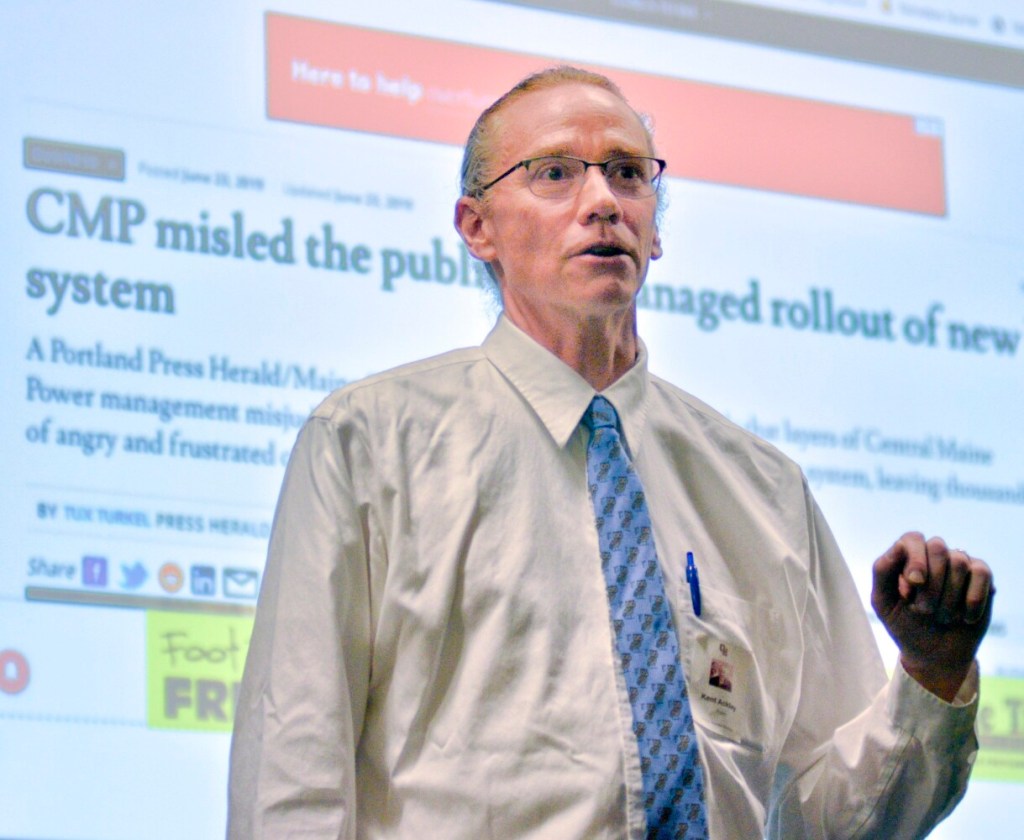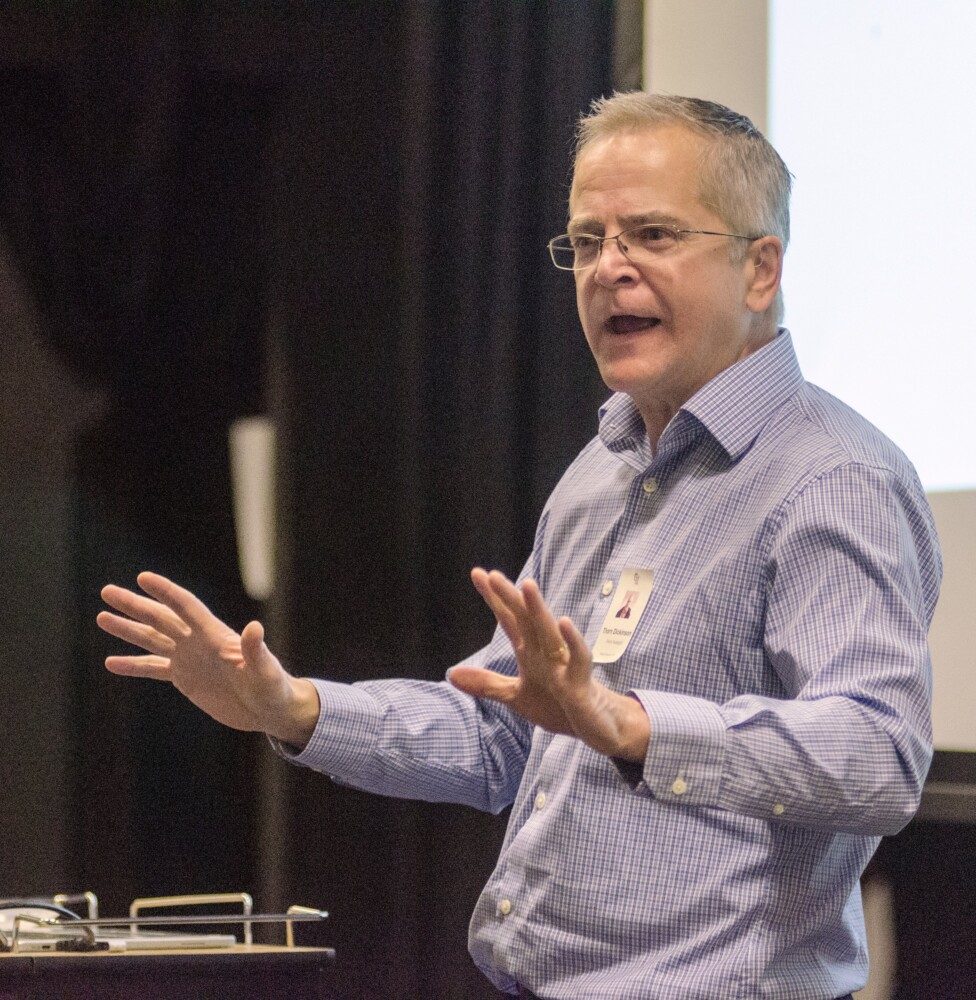WALES — A debate of the pros and cons of the proposed Central Maine Power corridor project Tuesday at Oak Hill High School left a group of ninth graders in opposition.
About 150 students were in attendance at the presentation, which featured Thorn Dickinson, vice president of business development for CMP parent company Avangrid, and state Rep. Kent Ackley, an Independent who represents Wales, Litchfield and part of Monmouth. Dickinson offered the perspective of those in favor of the proposed $1 billion, 145-mile transmission line that would run from the Quebec border to Lewiston; Ackley presented an anti-corridor viewpoint.
On Wednesday, four of the students in attendance for the presentation said they were generally opposed to the corridor, all citing Ackley’s arguments as a reason why they felt the way they did.

Riley Crosby on Wednesday at Oak Hill High School in Wales. Kennebec Journal photo by Joe Phelan Buy this Photo
Riley Crosby, 14, of Litchfield, said she appreciated that both speakers were respectful of each other during the presentation, even though today’s political climate can induce bitter arguments.
“I thought both speakers came from both sides of the spectrum,” she said. “There weren’t going at each other’s throats and they were being respectful, even though they disagreed.”
Crosby said she didn’t know much about the corridor, but left the presentation opposing it because she didn’t want any more trees being cut down to make room for the line.

Adam Greenwood on Wednesday at Oak Hill High School in Wales. Kennebec Journal photo by Joe Phelan Buy this Photo
Adam Greenwood, 14, of Wales, said he went into the presentation with an open mind but left opposed to the corridor. He said he was less moved by Dickinson’s presentation, because he was a representative from Central Maine Power and it didn’t seem like “his presentation.”
“He didn’t express his feelings when he spoke,” Greenwood said, adding that the information could have been more powerful coming from a party outside of the company.
Greenwood said his parents were opposed to the corridor, as his family spends time riding all-terrain vehicles and the construction could potentially hamper their ability to ride in some places.
The idea for the talk hatched from conversations science teacher Ed Zuis and career and technical education teacher Larry McCarthy had with students in their Technical Science class. The teachers reached out to Ackley and Dickinson, and then decided to open the presentation up to every student in the freshman class and any others who wanted to attend.
“A couple of the kids were gabbing about things that were going on,” McCarthy said. “We wanted (the students) to find out all of the data and get all of the real information about it, not just what they’re seeing on TV.”
Zuis said the objective of the presentation was for students to learn how to discuss potentially polarizing issues in a civil manner. The students will be writing persuasive essays supporting their opinion on the corridor using Ackley’s and Dickinson’s presentations and their own research as sources. Zuis said after the presentation that students enjoyed hearing both sides of the presentation.
Both speakers were given a chance to make opening remarks stating their case, then a brief period to respond to points made by the other. Dickinson said the corridor will connect hydropower from HydroQuebec into a grid that sends power to Massachusetts. He said 92 miles of the transmission line will follow existing power line corridors, adding about 75 feet to the existing width of the path to accommodate new construction, and the remaining 53 miles would be built through a working forest. Ackley said the corridor would impact the tourism industry by disrupting the state’s natural, untouched aesthetic with unsightly power lines.
Dickinson said the state’s Public Utilities Commission concluded that this project will reduce greenhouse gas emissions in the New England region, while Ackley said the impact of hydropower on greenhouse gas emissions in Canada have not been explored in the corridor project.

Abigail Kinsman on Wednesday at Oak Hill High School in Wales. Kennebec Journal photo by Joe Phelan Buy this Photo
Abigail Kinsman, 14, of Litchfield, said she was moved by Ackley’s point about emissions, because she is interested in having more clean energy coming into the state.
“I didn’t care about if CMP was going to make the (transmission line) or if they weren’t,” she said. “I think … Ackley did a better job, there were more concrete facts.”
Dickinson said there will be an energy savings of $20 million to $40 million for customers statewide if the corridor is built, as the supply of power would increase and the demand would stay steady.
In rebuttal, Ackley displayed a chart that showed the annual revenue going to each party involved in the corridor, showing about $500 million going to HydroQuebec, about $120 million for CMP and about $18 million for people in Maine. He said than $18 million works out to about a 40-cent-per-month decrease on power bills for each customer. Further, Ackley said, that revenue would likely be used to expand HydroQuebec’s business, therefore creating more harmful greenhouse gases through submersion of more land.

Cole Saucier on Wednesday at Oak Hill High School in Wales. Kennebec Journal photo by Joe Phelan Buy this Photo
Cole Saucier, 14, of Sabattus, said he was against the corridor before he walked into the presentation and maintained the same opinion afterward.
“I’ve never been for it, a lot of people I know aren’t for it,” he said. “We have a lot of camps where the corridor would be going through.”
Ackley said another reason he opposed the corridor was a growing distrust of CMP. He referenced a Portland Press Herald investigation published in June 2019 that showed that CMP mismanaged the change to a new billing system, leaving more than 100,000 customers with inaccurate bills. That appears to have dented the company’s reputation; the Press Herald reported in November 2019 that Central Maine Power ranked last in a survey of customer satisfaction out of 87 utility companies nationwide.
Send questions/comments to the editors.








Success. Please wait for the page to reload. If the page does not reload within 5 seconds, please refresh the page.
Enter your email and password to access comments.
Hi, to comment on stories you must . This profile is in addition to your subscription and website login.
Already have a commenting profile? .
Invalid username/password.
Please check your email to confirm and complete your registration.
Only subscribers are eligible to post comments. Please subscribe or login first for digital access. Here’s why.
Use the form below to reset your password. When you've submitted your account email, we will send an email with a reset code.